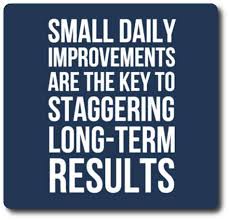 We’ve all been on the receiving end of compound interest. Our mortgage, credit cards, and even the Dentist love to tack on that interest. Luckily, it also works in our favor, if we’re wise enough to take advantage of it. For instance:
We’ve all been on the receiving end of compound interest. Our mortgage, credit cards, and even the Dentist love to tack on that interest. Luckily, it also works in our favor, if we’re wise enough to take advantage of it. For instance:
Compound Interest is Powerful
If you take $1 and save it, every week, for twenty five years, you would have $1,300. Not bad for a less than the cost of a donut. But, and this is the key, take that same $1 and invest it, adding $1 a week for 25 years, at a market average return of 9.19% (a which is the average market return adjusted for inflation 1988-2013), you would have $4,946.88. That’s $3646.88 (281%) more than saving it. Compound interest is a powerful thing.
Compound Living is Powerful
This post is not about your finances, so why am I waxing eloquent on compound interest? Because the same principle holds true in lifestyle design. You can save your energy or invest it. Your choice determines the difference in how effective your life will be. That is why some people are hundreds of times more effective than others, even though we all have the same 525,949 minutes a year. Time is what this is really all about.
 Finding Time
Finding Time
According to International Business Times (http://www.ibtimes.com/average-us-adult-spends-21-minutes-day-facebook-1691274) the average person–as of September 2014–spent 21 minutes a day on FaceBook. So, 21 x 7 x 52 x 25 = 191,100 minutes or 3,184 hours or 132.71 days. Oh, BTW, those are 24 hour days. If you want to look at it like work days…398.125 work days.
Now, I’m not about to bash FaceBook. The platform is amazing and useful, but it’s hard to look at those numbers and still say, “I don’t have time to do something amazing. There just aren’t enough hours in the day.” Imagine what we could do with our lives if we took back 10 of those minutes each day.
Small changes create big rewards
Small changes in how we use our time create big rewards over time

I’ll save you the arithmetic. By taking back ten minutes a day, we would gain ourselves 190 work days over 25 years. That’s a lot of time to build a business, volunteer for a cause that matters, or write the book you know you should be writing.
Small changes in how we use our time create big rewards over time. Where are you losing out on future riches by “saving” time instead of investing it? What could you accomplish in the next five, ten, or twenty-five years by finding ten extra minutes a day?
If you can’t find 10 extra minutes a day, you’re doing something wrong. Try this: https://www.headspace.com/ or stop by http://balanceisbunk.com and connect with me. I’ll help you figure it out.


 I hope to leave my family and friends with a legacy of life that will carry them through their grief and into a new world without me. To guide them through the valley of the shadow of death and into a new and open vista of all they can be. To inspire them to live their life with passion and courage.
I hope to leave my family and friends with a legacy of life that will carry them through their grief and into a new world without me. To guide them through the valley of the shadow of death and into a new and open vista of all they can be. To inspire them to live their life with passion and courage.

